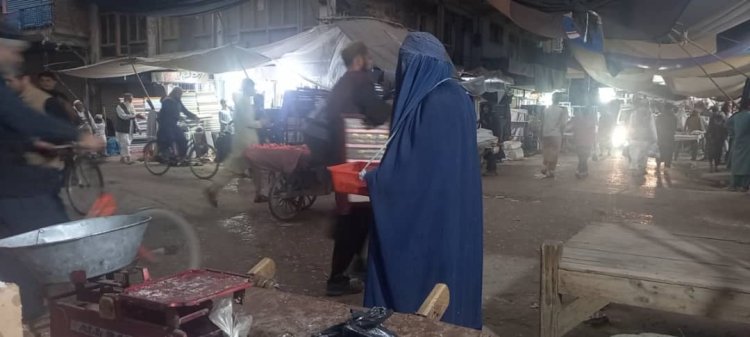War Widows in Afghanistan Forced to Beg Amidst Economic Hardship

In various provinces across Afghanistan, the prolonged wars have led many families to lose their male breadwinners, leaving women to shoulder the responsibility of supporting their households. Consequently, some of these women have turned to begging due to poverty and economic difficulties.
Recently, female beggars have been observed in different parts of cities, such as streets, mosques, and other public places. Locals report that many of these beggars are women whose family heads were lost during the past decades of conflict.
"My husband was a military officer in the previous government and passed away eight years ago. I have six children but no grown son. Whatever assets we had have been depleted; no one helps us. It's been two and a half years since I resorted to begging. I have no other option; we often go to bed hungry."
These are the words of 38-year-old Gul Zamina from the "Arzan Qimat" area of Kabul, who has borne the hardships of life since her husband's death.
According to her, after her husband's demise, poverty and destitution compelled her to beg to meet her family's needs.
She stated that her three brothers-in-law supported her and her six children for a year after her husband's death, but due to financial difficulties, they also abandoned her. Since then, she has been forced to beg to provide for her children.
Gul Zamina added: "After my husband's death, my brothers-in-law helped for a year, but then they told me they couldn't support my children. My children were too young to work—four daughters and two sons. I had no choice but to start begging. People give me between 50 to 80 Afghanis a day, but it's not enough to meet our household needs. We often survive on leftover bread from neighbors."
Gul Zamina, along with her two young daughters, stands in front of modern hotels in Kabul, extending her hand to passersby for help.
With a tearful voice, she says that since there is no one in the household to earn, she has to beg from morning until evening in the city streets to find a morsel of bread.
She adds: "I wish I had an older son who could work and support us at home, but there's no one to provide for us. Our life is in a very bad state; I am asking for help."
She criticizes that women whose husbands were not government employees receive no support after becoming widows, and there are no specific programs to help them become self-sufficient.
Among her children, the eldest is her seven-year-old son, Isa. His greatest wish is to have shelter and attend school.
Isa says he wants to go to school like other children and become a doctor or engineer, but their poverty has dashed his hopes.
He adds: "I want to go to school and study, but what can I do? My father is not alive, and there's no one else in the family to support us. I want to study and become a doctor or engineer in the future. Education is my biggest dream."
Gul Zamina's family is not the only one living a destitute and bitter life; many other women and children are in similar situations, looking to aid organizations for help.
Another woman, 35-year-old Shakiba from the Surkh Rod district of Nangarhar, lost her husband in the war and is now compelled to beg in Jalalabad city.
She pretends to sell pens, plastic, and other items in various crowded parts of the city while actually seeking help and begging from people.
She says she has nothing to feed and care for her four children and is the sole provider for her family. According to her, she has no other option but to beg.
Shakiba adds that her children also collect cartons and plastics from the city's garbage to find a piece of bread and continue their difficult lives.
She says: "My husband was killed in a mine explosion during the past wars. I have four children and live under a tent in the Surkh Rod district with them. I have no choice but to beg. We often go to bed hungry due to lack of food. No one has helped us, and no one has heard our cries."
According to her, not only do they lack food and clothing, but they also don't have a suitable place to live, which causes constant suffering.
Shakiba adds that to feed her children and provide for them, she has to extend her hand to people on the streets to collect charity so that her children don't go to bed hungry.
She criticizes that in Afghanistan, generally, women whose husbands were killed during government service receive pensions from the government. However, since the Taliban took over in 2021, these payments have stopped.
Shakiba says: "Previously, we used to receive up to 60,000 Afghanis annually as a pension, and every month we received food aid from the Martyrs and Disabled Affairs Department. But since the Taliban came, all these aids to widows and orphaned women have stopped, and we are facing an uncertain fate."
Her eight-year-old daughter, Shabnam, says she wants to go to school, but due to the family's poor economic situation and the absence of a male guardian, she cannot pursue education.
Shabnam adds: "When I see other girls my age going to school, I feel very sad. I wish my father were alive to enroll me in school. I ask for help."
Moreover, due to the Taliban's ban on women working in foreign aid organizations, many women have lost their jobs.
In Afghanistan, where a woman's life is largely tied to her husband, there are many widowed and impoverished women facing similar fates.
Decades of war in the country have left hundreds of thousands of women widowed, and some statistics indicate that one in every five women in Afghanistan is a widow.
